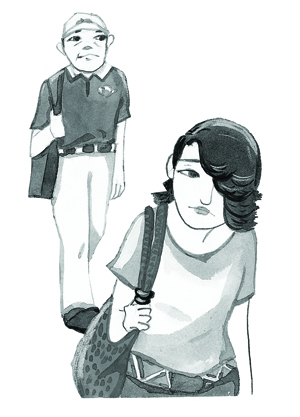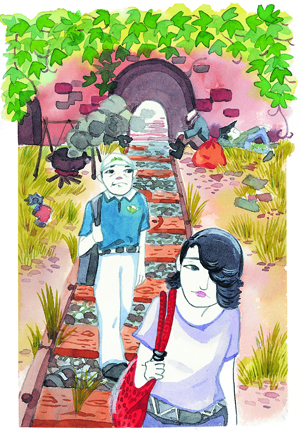

| It’s Better Unsaid | ||
| By Lin Wen-zhao Translated by Tang Yau-yang Painting by Luo Fang-jun | ||
When the alarm clock went off at 5:45 a.m., I walked quietly to my youngest daughter’s door and gently knocked. “Time to get up, Yi-shan [怡珊],” I said. I woke her up so early because we had planned to volunteer for Tzu Chi and distribute breakfasts to the homeless that day. But to be honest, I hadn’t expected that things would turn out that way. We’d actually planned the same thing many times before, but she’d always backed out at the last minute. There was always an excuse as to why she could not go: She’d gone to bed too late the previous night, she couldn’t get out of bed so early, or some other reason. “Perhaps next time,” she used to say. She’d said that to me over and over again, every single time. I had no reason to think this morning would be any different. I guess that’s why I was surprised when she responded, “I’ll be right there.” It was only when she got in the car I was certain that, after having failed for nearly four years, we were finally going to work together at our first breakfast distribution.
Better done than said Tzu Chi volunteers provide free breakfasts each Sunday morning, rain or shine, to street people at several locations in San Jose, California. The distribution started at seven at the first location, about a 50-minute drive from my house. To get there on time, Yi-shan and I set out before six that morning. As my car cruised down the peaceful, quiet highway in the early morning, mixed emotions churned inside me, somewhat like the excitement and anxiety that I’d felt on the first day of my first job, 30 years earlier. In the car, my daughter wasn’t going anywhere and there wouldn’t be anything to distract her attention, so it seemed like a perfect time and place for me to “sell” Tzu Chi to her. I really wanted to tell her about every good thing that the foundation had done and the reason why I’d been bent on following this path. The maxim “Well begun is half done” was in my mind. I really wanted her to have a favorable first impression of Tzu Chi. I wanted so much to tell her that persistent giving would benefit her all her life, that she would get more than she would ever need in life—not in wealth or business connections, but in peace of mind and inner happiness. I wanted to give her a tool with which she’d be able to surmount any difficulties she might encounter in her life. I was also deeply convinced that doing volunteer work would give her ample opportunity to reflect and ponder, and to know life and herself better. I had so much to say to her. Where should I start? I cast a sidelong glance at her and saw that her eyes were closed—perhaps stealing a little more sleep. Then I recalled the many times I’d delivered long sermons to her. I thought I was doing her good by preaching to her, but my efforts had backfired every single time. At those times, I caused exactly the opposite of what I’d set out to do. My experience taught me that preaching hadn’t gotten me very far. I think that’s why Master Cheng Yen says, “Just do it.” If simply saying it would do the job, she would have taught us to “Just say it.” I finally decided against hard-selling Tzu Chi to Yi-shan. Instead, I spent only a few minutes describing what our group would do that day. “First, we’ll serve breakfasts in the dining hall of a half-shelter, half-hotel kind of place—because it’s half free to its residents. The recipients there are street people, but at least they have a roof over their heads. “The second stop is in a church parking lot. The distribution there begins at eight. About a hundred people will be there for the food. We start at the third site at nine o’clock, where we’ll feed about 20 people. Most of them sleep next to a deserted railroad track or under a bridge not very far away.” I didn’t say anything more after the brief introduction. I’d made up my mind to remain silent unless she asked questions. In my heart I knew that it would take more than my eagerness and my words to convince her to volunteer for Tzu Chi. Everything in life, including volunteer work, is a result of karmic affinities. You can’t just force something on people and expect them to stay the course.
Front and center Efficiency is not the ultimate objective of many Tzu Chi events. For example, sometimes ten volunteers work on a five-person task, just so that more people can experience the joy of giving. Likewise, it is commonplace for experienced volunteers to take themselves out of a task so that new volunteers can get a chance to do it and receive a sense of belonging and participation. That’s why, after I’d introduced my daughter to the other volunteers, they told her to warmly greet the homeless and to give them a big smile… and then they put her to work at the very front of the service line. Two kinds of hot soup were offered that day—egg-drop soup and potato soup. My daughter’s job was to ask the people which kind they wanted and then serve it to them. My memory had declined with age to the point that I often forgot the names of my friends, so I always made a special effort to write down and memorize the names of the homeless. Many old acquaintances came this day: Charlie, a tall roadside painter; Jose, an unemployed baker; and John, the most diligent of the bunch, who had never been seen without a dictionary in hand. Yi-shan shook hands with each of them as I introduced them to her. Andy, short in stature and sporting a large beard, was surprised when I introduced Yi-shan to him. “Is she really your daughter?” he asked. “Of course, she is,” I said. Andy obviously felt flattered that I would introduce my own family to him. He then asked me, “What’s your name?” Now, that was a surprise to me. Most of the people who came for breakfast would usually just pick up their meal and leave. Very few ever stopped to talk to us. Andy had never shown any interest in making my acquaintance over the years. I’d say “good morning” to him each time, and he’d just return my greeting and smile back. That had been it. But now he was asking for my name; he must have been considering making friends with me. After the distributions at the first two sites, our group delivered breakfast to the people living by the railroad track and underneath the bridge. They were still lying in their sleeping bags, their eyes bleary and heavy with sleep.
Yi-shan and I stepped from one railroad tie to the next during the course of the distribution. I wondered what was going through my daughter’s mind as we looked at this group of homeless people who’d been all but forgotten by society. I threw a quick glance at her to see if I could discern her thoughts. Only then did I see that her eyes were red. She was holding back her tears. Seeing her like that, I didn’t have the heart to tell her that these people, with nowhere else to go or hide, had been totally exposed to the violent, merciless thunderstorm that had hit the area the week before. Instead, to distract her and lighten up her mood, I told her a story: Zhu Yuan-zhang (朱元璋), the first emperor of the Ming Dynasty, was once a homeless monk. He drifted from one place to another, begging for alms while striving for something bigger. As the Mongol-led Yuan Dynasty was crumbling, ethnic Hans, including Zhu, vied for influence and control. Eventually, in 1368, Zhu won out and founded the Ming Dynasty that would rule China until 1644. “Zhu didn’t even have a sleeping bag,” I told my daughter. Looking at those homeless people curled up in their sleeping bags, she seemed to feel better.
One step at a time I continued to refrain from talking about Tzu Chi on the way home that day. This time, however, it was she who brought it up first: “I wish that I’d come with you and volunteered for Tzu Chi three years ago, Dad.” “It’s never too late,” I replied. “You’re still very young. I do hope that you join up soon, though. Don’t be like me. I only found Tzu Chi when I was already 50 years old.” Yi-shan knew well how my business had gone over the years. My business suffered greatly after the 9/11 attacks and the collapse of the Internet bubble. But while that business was falling off, my other “business” was expanding. In fact, it quadrupled from 50 to 200. Those were the numbers of bananas that I’d been responsible for bringing to the breakfast distributions each Sunday. In the early days I’d bring 40 to 50 bananas each time. Nowadays I needed 200 for all three sites. One’s circumstances may rise, fall, wax or wane, but regardless of one’s standing, Tzu Chi teaches everyone to be humble. How could I begin to explain this profound Tzu Chi teaching to Yi-shan? Now she’s in the first year of her post-graduate study, just a time when she needs to build all the confidence in the world to help her through the challenges that will come her way. How can I explain it to her so that she’ll understand the importance of reining in her ego without making her lose her confidence? Authentic confidence comes from deep self-reflection, and a reduced ego makes one more resilient. This allows a person to go forward or backward at ease, whether sailing on a calm sea or riding through rough waves. One who is humble will be better able to rise again after being struck down. He can strive persistently for his ideals, taking whatever detours he needs to get him to his destination. In short, a person with authentic confidence is as undefeatable as a blade of grass under a boulder. Though heavily outweighed, when the grass finds a crack in the rock, that is all the breathing room it needs to put its shoots through and reach toward the sky. How can I transmit such a profound concept to Yi-shan? All I can do, really, is to take each step as it comes. Today’s outing was a good start. Not bad at all. The road ahead is full of promise. I’ll be patient. |
















|


